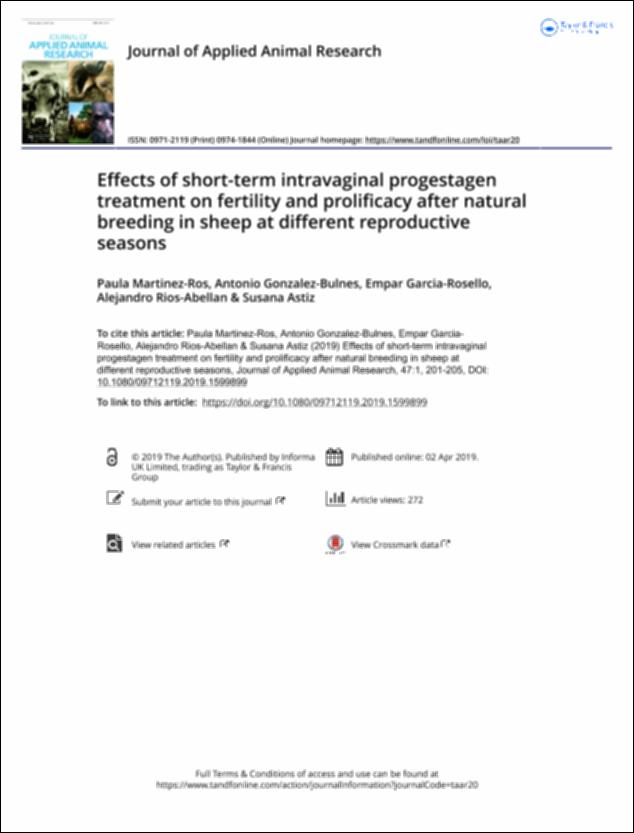Please use this identifier to cite or link to this item:
http://hdl.handle.net/10637/10604Effects of short-term intravaginal progestagen treatment on fertility and prolificacy after natural breeding in sheep at different reproductive seasons
| Title: | Effects of short-term intravaginal progestagen treatment on fertility and prolificacy after natural breeding in sheep at different reproductive seasons |
| Authors : | Martínez Ros, Paula González de Bulnes López, Antonio García Roselló, Empar Ríos Abellán, Alejandro Astiz Blanco, Susana |
| Keywords: | Ovejas - Reproducción.; Prostaglandinas.; Prostaglandins.; Reproduction.; Reproducción animal.; Estro.; Estrus.; Sincronización.; Sheep - Reproduction.; Synchronization. |
| Publisher: | Informa UK. |
| Citation: | Martinez-Ros, P., Gonzalez-Bulnes, A., Garcia-Rosello, E., Rios-Abellan, A. & Astiz, S. (2019). Effects of short-term intravaginal progestagen treatment on fertility and prolificacy after natural breeding in sheep at different reproductive seasons. Journal of Applied Animal Research, vol. 47, n. 1 (abr. 2019), pp. 201-205. DOI: https://doi.org/10.1080/09712119.2019.1599899 |
| Abstract: | The present study indicates that short-term progestagen-based protocols for synchronization of estrus and ovulation in sheep involving 7 days of progestagen insertion with administration of prostaglandin F2α at either insertion or removal of the progestagen sponge resulted in 80–90% fertility during the breeding season, while a classical long-term protocol of 14 days of progestagen insertion resulted in 77% fertility. During the non-breeding season, fertility was significantly higher for the 7-day protocol with prostaglandin administration at sponge insertion (79.2%) and for the 14-day protocol (80%) than for the 7-day protocol with prostaglandin administration at sponge removal (59.1%; P = 0.018). Prolificacy, in contrast, varied significantly with genotype, being higher in prolific breeds, but it did not vary with progestagen protocol or breeding season. These results suggest that short-term progestagen-based treatments can provide similar reproductive efficiency as long-term treatments, which may help practitioners reduce welfare and health issues while maintaining productivity. |
| Description: | Este artículo se encuentra disponible en la siguiente URL: https://www.tandfonline.com/doi/full/10.1080/09712119.2019.1599899 |
| URI: | http://hdl.handle.net/10637/10604 |
| Rights : | http://creativecommons.org/licenses/by/4.0/deed.es |
| ISSN: | 0971-2119 0974-1844 (Electrónico) |
| Issue Date: | 25-Apr-2019 |
| Center : | Universidad Cardenal Herrera-CEU |
| Appears in Collections: | Dpto. Producción y Sanidad Animal, Salud Pública Veterinaria y Ciencia y Tecnología de los Alimentos |
Items in DSpace are protected by copyright, with all rights reserved, unless otherwise indicated.


